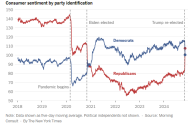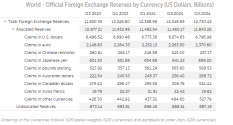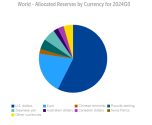I skimmed the first half of the post, and let me show you something about "vibes" in Western society. Just as a demo for how little empirical value they have.It's about the comparative weight of evidence for both arguments. Here If you are truly sincere I will link you to some of that evidence so we don't polite this thread too much. This. Ignore the Taiwan part, and please keep in mind, that in 1 year since I wrote this, dozens of similar indicators have hit my radad, that I have bookmarked in various places. Also, that was just socio-political part, not geo-economic as well.

Note how consumer sentiment jumped up 60 points due to an election victory. Vibes and surveys isn't economic data. It's just vibes and surveys and are far more useful to political campaigns than economic analysis.
It's relevant now, you just have not been informed. Since gold has broken out of the Western-dominated artifical price supression, everyone can put reserves there at any moment. They are already increasingly doing so, but give them a trigger, such as the US's aggressive financial warfare against China, and this trend will be completed in 4 months, not 40 years. These are trends from around half a year ago when I followed this, and I'm sure it only supercharged by now. This, this, this. My point is that the alternative is finally present and well thought out now!


And China itself has an enormous amount of USD denominated reserves for obvious reasons. I don't know why you're arguing this point, this isn't going to change in 2025.
We're not talking about the EU, and no they didn't help. Sanctions hurt Russia. While I can see and in fact, agree, with arguments that this is better for Russia in the long-term, it is absurd to ignore the obvious effects of sanctions on Russia's economy.
I'm not saying that the US doesn't have good mililtary technology, but that they don't have EDGE, this is what you said.
China now totally narrowed the gap and made it useless. The competition between them will now hence be in industrial might.
This isn't true. United States retains advantage in submarines and has a very significant advantage in the Space domain.
Higher inflation measures would make nominal GDP appear larger. LolYou do understand that they in that period, the starting point coinceding with that real wage growh period?
Can't you understand why? Because if you downplay inflation, they your real growth would be higher since real growth = absolute growth - inflation?
Well yeah, I have never said I'm not comparing them. I just stated that's its unfairly biased in heavily wealth stratified countries like US and India. Would you agree India is ahead of Russia, Japan and Germany in "economic strength"? I'd not, so all I'm saying is that gdp and economic strength actually diverges a bit.
This is contingent on what one defines as "economic strength". But just to demonstrate that nominal GDP does in fact matter, It's not a stretch to say that Germany, which does have a much higher GDP than India, is more powerful and has more economic coercion tools than India.
By that same token, India probably is stronger economically than Italy or Brazil. It is hard to know where Russia is ranked currently, because Russian GDP is heavily distorted by FX rates, which are affected by a few factors like the Ukraine war and US Sanctions, which are largely non-economic factors.
I.E. Russia's nominal GDP is being repressed by irrational non-economic factors.
I don't understand as this is already a past event since 2015.
It isn't. China's nominal GDP is still below US's nominal GDP.
Don't understand this statement either, Chinese economical acitivty is in RMB and US' in USD, those are their "nominal" measures which you can't compare on a macroeconomic scale.
The airport exchange rate is 1 dollar to 7.33 rmb, but you cannot exchange even 1 million dollars to 7.33 million rmb or vice versa due to currency controls, so the practical value of 1 million dollars in US and 7.33 million rmb in China has already diverged.
Hence to create a comparative measurement of the many trillion dollar sized Chinese and American economies, a statistical model to approximate the exchange rate of currencies across massive amounts is mandatory.
It's not so much about "practical value" as it is about the value of currencies on the global market, and yes, this matters.

